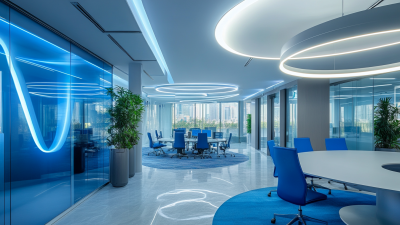
Office lighting plays a crucial role in shaping workplace productivity and employee wellbeing. According to a study by the American Society of Interior Designers, adequate lighting can increase workplace productivity by up to 20%. Additionally, a report from the National Institute of Health indicates that proper lighting reduces eye strain and headache occurrences by 40%, directly impacting employees’ comfort and performance. In recent years, intelligent office lighting solutions have emerged as a transformative approach that not only enhances the aesthetic of workspaces but also promotes a healthier and more efficient working environment. By utilizing dynamic lighting systems that adapt to natural light levels and employee routines, organizations can maximize productivity while simultaneously fostering employee satisfaction. As the shift towards smarter workplaces continues, understanding the significance of office lighting becomes essential for businesses aiming to boost their operational efficiency and cultivate a positive workplace culture.

In today's fast-paced work environment, the integration of innovative technologies into office lighting solutions is crucial for enhancing both productivity and employee wellbeing. Intelligent office lighting systems not only provide optimal visibility but also adapt to the needs of different tasks throughout the day. For example, smart lighting can adjust brightness levels based on the time of day, simulating natural light and reducing eye strain, which is vital for maintaining focus and energy.
Tips: To maximize the benefits of intelligent lighting, consider incorporating adjustable LEDs that allow employees to control their workspace ambiance. Additionally, utilize circadian rhythm-friendly lighting that shifts throughout the day to mimic natural light changes, fostering a healthier work atmosphere.
Moreover, the adoption of sensors and automated systems can significantly improve energy efficiency. These technologies can detect when a space is unoccupied and automatically dim or turn off lights, thereby reducing energy consumption and costs. This not only benefits the company's bottom line but also supports sustainable practices.
Tips: When installing smart sensors, ensure they are placed thoughtfully to cover high-traffic areas while minimizing unnecessary light activation in low-traffic zones. Engaging employees in the process of personalization can lead to a more satisfied and productive workforce.
Adaptive lighting in office environments significantly influences employee wellbeing and productivity. According to a report by the American Society of Interior Designers, well-designed lighting can enhance productivity by up to 20%. This is particularly relevant in modern workplaces where employees often spend the majority of their day indoors. Optimizing natural light levels through adaptive lighting solutions not only creates a more pleasant atmosphere but also helps in regulating circadian rhythms, which are crucial for maintaining energy levels and focus throughout the workday.
Moreover, a study published in the Journal of Environmental Psychology highlights that employees exposed to dynamic lighting conditions report higher job satisfaction and lower stress levels. Specifically, 60% of participants stated that improved lighting conditions contributed to a more positive mood at work, creating an environment that fosters creativity and collaboration. Companies aiming to boost their bottom line should consider investing in intelligent lighting solutions that adapt to the changing needs of their workforce, ultimately leading to healthier and more productive work environments.
Integrating smart solutions into office environments is becoming crucial as companies aim to enhance both productivity and employee wellbeing. A study by the American Society of Interior Designers revealed that proper lighting can improve workplace satisfaction by up to 20%. By utilizing intelligent office lighting systems, businesses can create an atmosphere that adjusts to the needs of their workforce. These systems can automatically adapt to the natural light outside, ensuring that employees are always bathed in optimal lighting conditions, reducing eye strain and fatigue.
Moreover, smart lighting can significantly contribute to sustainability efforts within offices. According to the International Energy Agency, buildings account for approximately 36% of global energy use, with lighting alone representing around 19% of this consumption. By implementing LED technology and automated controls, organizations can cut their energy use by nearly 70%. This shift not only lowers operational costs but also demonstrates a commitment to environmentally responsible practices.
**Tips for Implementation:**
1. Invest in smart lighting that syncs with daylight patterns for optimal energy use.
2. Encourage user preference settings, allowing employees to adjust light levels according to their comfort.
3. Regularly monitor energy consumption metrics to gauge the effectiveness of your lighting solutions and adjust strategies as needed.
| Lighting Type | Impact on Productivity (%) | Reduction in Eye Strain (%) | Employee Satisfaction (Rating out of 10) | Energy Efficiency (kWh/year) |
|---|---|---|---|---|
| LED Lighting | 20 | 30 | 8 | 2000 |
| Smart Sensor Lights | 25 | 40 | 9 | 1800 |
| Tunable White Lighting | 15 | 25 | 7 | 1500 |
| Natural Light Simulation | 30 | 50 | 9.5 | 2200 |
Intelligent lighting solutions have transformed office environments by enhancing both productivity and wellbeing. One compelling case study is a large tech company that implemented smart lighting systems in their open-plan office. By utilizing daylight-responsive lighting and adjustable color temperatures, employees reported increased alertness and focus throughout the day. This adaptability not only catered to individual preferences but also mirrored natural sunlight patterns, minimizing the adverse effects of artificial lighting.

Another notable example comes from a healthcare facility that integrated circadian lighting into its design. This intelligent lighting system adjusts in intensity and hue according to the time of day, promoting better sleep patterns among staff and patients. Feedback from both caregivers and patients showed a significant improvement in mood and overall well-being, which correlated with enhanced job satisfaction and reduced stress levels. These case studies underscore the importance of intelligent lighting in fostering environments that support both productivity and health, demonstrating clear, measurable benefits that extend beyond mere aesthetics.
 In the realm of office design, the importance of intelligent lighting solutions cannot be overstated. As we look towards the future, a key trend is finding the perfect balance between advanced technology and employee comfort. Smart lighting systems, equipped with IoT capabilities, allow for personalization and adaptability based on individual preferences and work patterns, significantly enhancing the overall working environment.
In the realm of office design, the importance of intelligent lighting solutions cannot be overstated. As we look towards the future, a key trend is finding the perfect balance between advanced technology and employee comfort. Smart lighting systems, equipped with IoT capabilities, allow for personalization and adaptability based on individual preferences and work patterns, significantly enhancing the overall working environment.
Tips: Consider integrating circadian lighting that adjusts throughout the day to mimic natural light. This not only boosts mood and productivity but also helps regulate employees' internal clocks, leading to better health outcomes. Moreover, implementing dimmable LED systems can cater to varying tasks and times of day, giving workers more control over their immediate surroundings.
Investing in lighting design that prioritizes both functionality and comfort can dramatically impact employee wellbeing. Utilizing light color temperature adjustments can create an invigorating atmosphere during brainstorming sessions, while softer, warmer tones can promote relaxation during downtime. By focusing on these future trends, organizations can effectively harness intelligent office lighting to create spaces that foster creativity and collaboration.






Let us help you get started with our superior LED lighting products.
Get all the latest news from BrightLED.
Copyright © Bright LED. All rights reserved.
STAY CONNECTED

